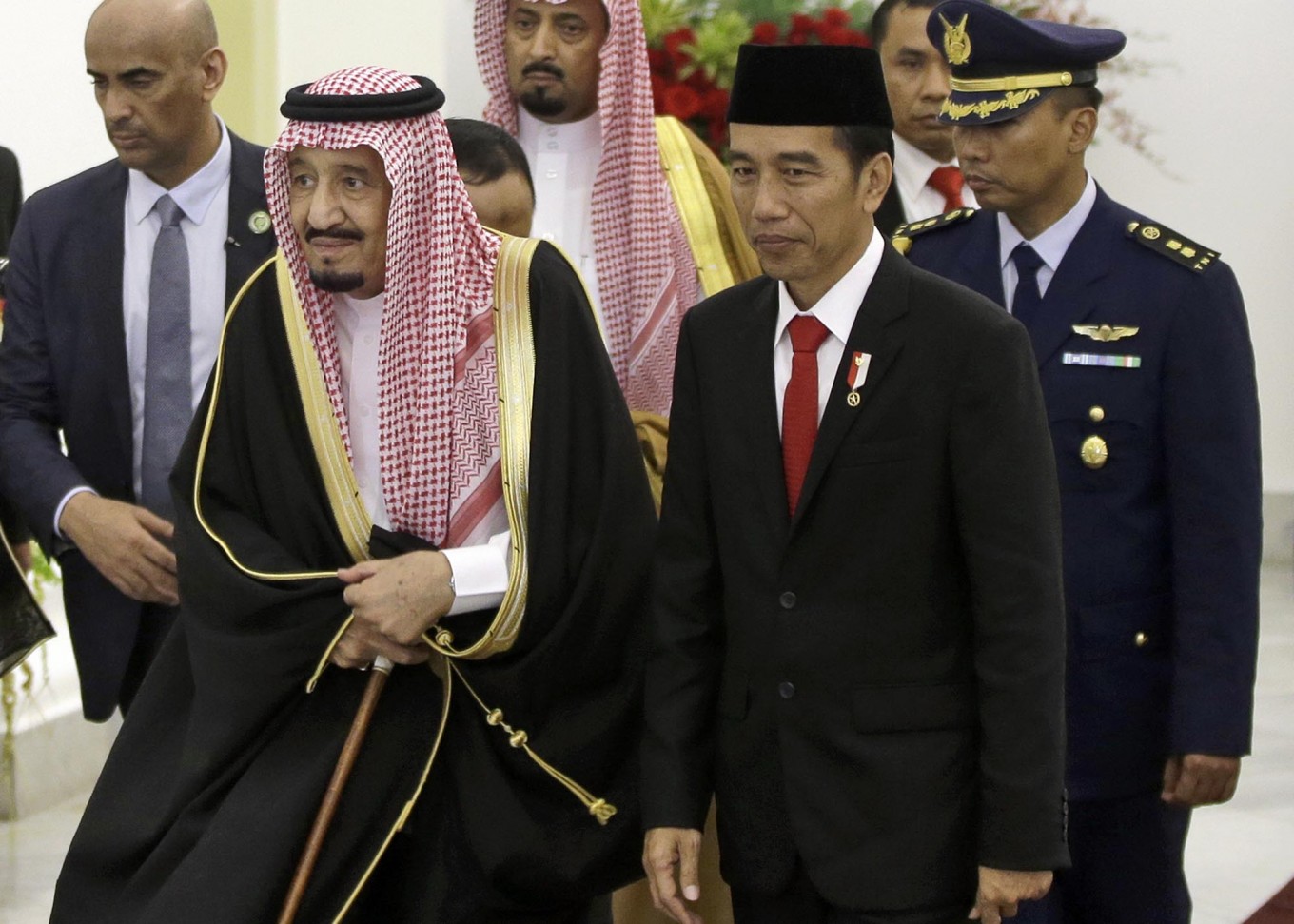Popular Reads
Top Results
Can't find what you're looking for?
View all search resultsPopular Reads
Top Results
Can't find what you're looking for?
View all search resultsIndonesia should seek more economic cooperation with Gulf States
Today, the Kingdom of Saudi Arabia is responsible for most of the funding that flows from the Gulf, though most of it is earmarked for religious purposes. Despite President Joko “Jokowi” Widodo demonstrating some disappointment in 2017 regarding the declining amount of funding the country was expected to receive, the Saudi government remains an important partner.
Change text size
Gift Premium Articles
to Anyone
 Saudi King Salman, left, walks with Indonesian President Joko Widodo during their meeting at the presidential palace in Bogor, West Java, Indonesia, Wednesday, March 1, 2017. Salman arrived in the world's largest Muslim nation as a part of a multi-nation tour aimed at boosting economic ties with Asia. (AP/POOL/Achmad Ibrahim)
Saudi King Salman, left, walks with Indonesian President Joko Widodo during their meeting at the presidential palace in Bogor, West Java, Indonesia, Wednesday, March 1, 2017. Salman arrived in the world's largest Muslim nation as a part of a multi-nation tour aimed at boosting economic ties with Asia. (AP/POOL/Achmad Ibrahim)
T
he Arab world has long-rooted ties in Indonesia, as historic indications reveal that the first traders initially reaching the archipelago in the fifth century. Since then the Arab world has provided maritime trade and financial services.
When Islam finally made its way to Indonesia, the two cultures already exhibited a strong financial and cultural bond thanks to Arab trade and migration. The routes that were initially used for trade have helped the ties between Indonesia and the Arab world flourish as Islam’s influence expanded throughout the world.
Indonesia is home to the world’s largest Muslim population; over 225 million people, or nearly 13 percent of the world’s Muslims, live in the country.
In the past decade Indonesia’s economy has grown, with few exceptions, between 5 percent and 6 percent annually for nearly 14 years. This impressive consistency is the result of a strong macroeconomic policy, modernization efforts, and a focus on stability following the collapse of Soeharto’s military regime.
While Indonesia’s successive governments deserve the lion’s share of the credit for this turnaround, this new status quo as an economic force and a beacon of Islam in Southeast Asia is also due to the Persian Gulf’s influence and efforts.
Today, the Kingdom of Saudi Arabia is responsible for most of the funding that flows from the Gulf, though most of it is earmarked for religious purposes. Despite President Joko “Jokowi” Widodo demonstrating some disappointment in 2017 regarding the declining amount of funding the country was expected to receive, the Saudi government remains an important partner.
For instance, Saudi Arabia still supports enormous investments in Islamic education throughout the country. This has been the primary strategy undertaken by the Saudis to extend its soft power over the past 40 years, and includes establishing Islamic schools, providing educational materials, and financing scholarships based in the Kingdom. This support is still largely employed to expand Saudi influence instead of spurring economic activity.
The rest of the Gulf states, however, view Indonesia as a valuable partner and investment that stretches beyond religious motives. While Saudi interest lies in reinforcing influence through religious funding, the real focus for the Gulf States should be attuned towards economic cooperation and investment. Indeed, while Indonesia’s economy has been stable, its infrastructure is quickly growing obsolete as its economic engine slows.
This is not news to the Gulf. In 2017, the Indonesian government sought a total investment of US$10 billion from the United Arab Emirates, even as the country’s private sector was already providing $2 billion in total capital for Indonesian energy and retail sectors. Similarly, Oman recently signed a major agreement with Indonesia worth $14 billion to build a refinery capable of handling 300,000 barrels of oil per day.
However, foreign direct investment in Indonesia from the Gulf States pales in comparison to other foreign benefactors (the top five sources of foreign funds are Singapore, Japan, South Korea, China, and Hong Kong). This reality should concern the Gulf states. While it simply represents a slight loss of trade influence, it also signals that the Gulf is losing a critical ally in one of the world’s fastest-growing economies. This is unacceptable both in financial and political terms.
Indeed, the Gulf states should view this loss of influence seriously. As the world’s largest Muslim state by population, Indonesia is a vital cultural and political ally for the Arab world in Southeast Asia. Additionally, the economic landscape poses a national security threat to Indonesia, which should concern the Arab world. China has been known to invest heavily in nations to exert both soft and hard power, and it seems to be following a similar pattern with Indonesia. Waning influence of Saudi’s kingdom and others of the Gulf, in the biggest bastion of Muslim and Arab interests in Southeast Asia, represents a loss of leverage that affects the Gulf’s financial stakes around the world.
Outside of Saudi Arabia’s religious funding and “soft power” tactics, the Gulf has not been a major investor in the country’s growth trajectory. That status quo, however, cannot endure. For the Gulf states, Indonesia represents an important economic and political ally in a region that represents a major growth hub. More importantly, however, this new funding should be economic, and not religious, reinforcing the idea that the Gulf views Indonesia as an equal in cooperation instead of a pawn for regional politicking.
***
The writer is a political consultant based in Dubai. He specializes in assisting Middle Eastern funds and business people seeking to invest in Indonesia and Southeast Asia.










